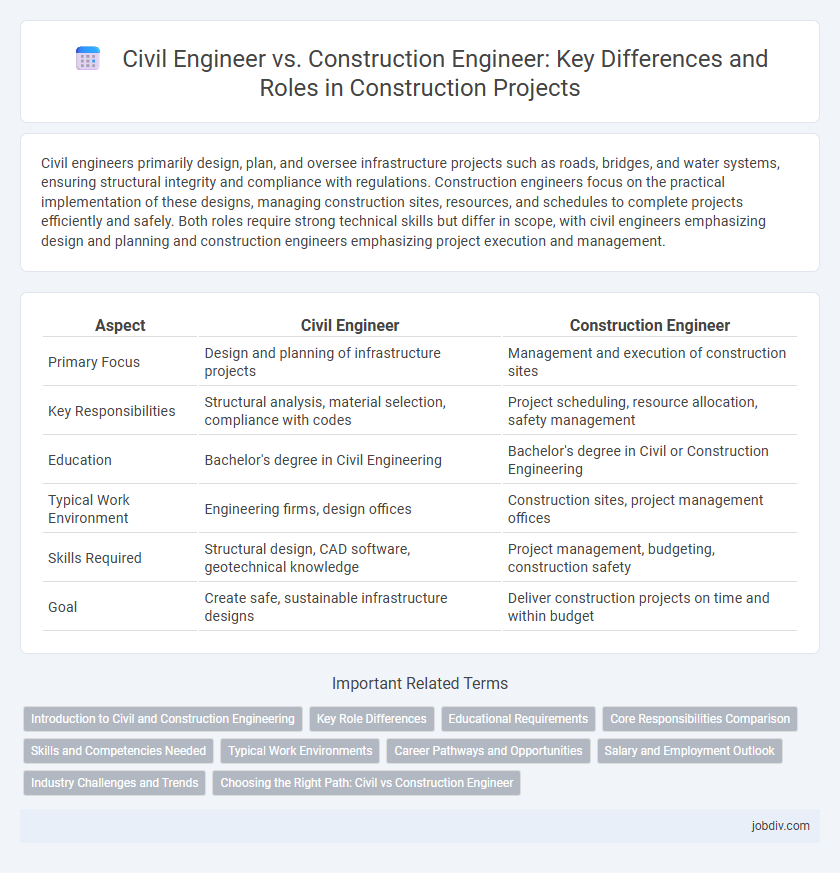Civil engineers primarily design, plan, and oversee infrastructure projects such as roads, bridges, and water systems, ensuring structural integrity and compliance with regulations. Construction engineers focus on the practical implementation of these designs, managing construction sites, resources, and schedules to complete projects efficiently and safely. Both roles require strong technical skills but differ in scope, with civil engineers emphasizing design and planning and construction engineers emphasizing project execution and management.
Table of Comparison
| Aspect | Civil Engineer | Construction Engineer |
|---|---|---|
| Primary Focus | Design and planning of infrastructure projects | Management and execution of construction sites |
| Key Responsibilities | Structural analysis, material selection, compliance with codes | Project scheduling, resource allocation, safety management |
| Education | Bachelor's degree in Civil Engineering | Bachelor's degree in Civil or Construction Engineering |
| Typical Work Environment | Engineering firms, design offices | Construction sites, project management offices |
| Skills Required | Structural design, CAD software, geotechnical knowledge | Project management, budgeting, construction safety |
| Goal | Create safe, sustainable infrastructure designs | Deliver construction projects on time and within budget |
Introduction to Civil and Construction Engineering
Civil engineering encompasses the design, construction, and maintenance of infrastructure such as roads, bridges, and water systems, emphasizing structural integrity, environmental impact, and public safety. Construction engineering focuses on project management, construction methods, and cost estimation to efficiently execute engineering designs on-site. Both disciplines collaborate to ensure the successful completion of infrastructural projects from planning to delivery.
Key Role Differences
Civil engineers primarily focus on the design, analysis, and supervision of infrastructure projects such as roads, bridges, and water supply systems, ensuring structural integrity and compliance with safety standards. Construction engineers concentrate on project management, overseeing construction processes, resource allocation, and site operations to ensure timely and budget-compliant completion. Both professions require collaboration but differ in emphasis, with civil engineers focusing on technical design and construction engineers on execution and logistics.
Educational Requirements
Civil engineers typically require a bachelor's degree in civil engineering, encompassing courses in structural analysis, geotechnics, and transportation engineering. Construction engineers often pursue a degree in construction engineering or a related field that integrates project management, construction methods, and cost estimation. Both disciplines benefit from licensure such as the Professional Engineer (PE) certification to advance career prospects.
Core Responsibilities Comparison
Civil Engineers primarily focus on designing, planning, and overseeing infrastructure projects such as roads, bridges, and water systems, ensuring structural integrity and compliance with regulations. Construction Engineers concentrate on managing construction processes, including resource allocation, site supervision, and project scheduling to ensure timely and cost-effective completion. Both roles require collaboration but differ in that Civil Engineers emphasize design and analysis, while Construction Engineers prioritize execution and operational management.
Skills and Competencies Needed
Civil engineers require strong analytical skills, proficiency in structural analysis, and expertise in materials science to design infrastructure projects like bridges and roads. Construction engineers focus on project management skills, cost estimation, and construction methods to oversee the execution and ensure safety and compliance on-site. Both fields demand proficiency in CAD software, understanding of building codes, and effective communication to coordinate multidisciplinary teams.
Typical Work Environments
Civil engineers typically work in office settings, construction sites, and government agencies, focusing on infrastructure projects like roads, bridges, and water systems. Construction engineers spend more time on-site, managing construction processes, ensuring safety compliance, and coordinating project logistics. Both roles require collaboration with architects, contractors, and stakeholders but differ in their primary work environments and day-to-day responsibilities.
Career Pathways and Opportunities
Civil engineers specialize in designing, planning, and overseeing infrastructure projects such as bridges, roads, and water systems, leading to career opportunities in public works, environmental agencies, and consulting firms. Construction engineers focus on managing construction processes, project execution, and site supervision, offering pathways in construction management, contractor companies, and project coordination roles. Both fields demand strong technical skills, but civil engineers often engage in design and analysis, while construction engineers emphasize practical implementation and resource management.
Salary and Employment Outlook
Civil engineers typically earn a median salary of around $88,000 per year, while construction engineers have a slightly higher median salary near $95,000 annually due to their specialized project management roles. Employment growth for civil engineers is projected at 8% over the next decade, driven by infrastructure development, whereas construction engineers face a 10% growth rate fueled by increasing commercial and residential building projects. Both careers offer strong job security, but construction engineers may have a competitive edge in urban development environments.
Industry Challenges and Trends
Civil engineers primarily tackle infrastructure design and environmental sustainability, while construction engineers focus on project execution and on-site management, addressing budget constraints and timeline pressures. Industry trends reveal a growing emphasis on integrating Building Information Modeling (BIM) and sustainable construction materials to enhance efficiency and reduce environmental impact. Challenges include adapting to rapid technological advancements and enforcing rigorous safety standards amid increasing project complexities.
Choosing the Right Path: Civil vs Construction Engineer
Civil engineers specialize in designing and overseeing infrastructure projects such as bridges, roads, and water systems, emphasizing structural integrity and environmental impact. Construction engineers focus on managing construction processes, ensuring project execution aligns with design specifications, timelines, and budget constraints. Selecting between civil and construction engineering depends on whether your interest lies more in design and analysis or in project management and onsite problem-solving.
Civil Engineer vs Construction Engineer Infographic

 jobdiv.com
jobdiv.com